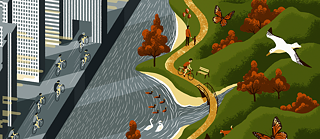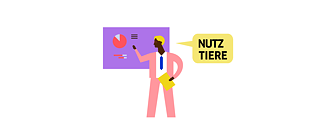We own pets, slaughter meat breeds, pull weeds, and associate warmth with something pleasant. Lena Maurer discusses how language can change our perception of nature.
In the Middle Ages, it was a star: the medlar – an undemanding shrub that needs lots of light and sun, with fruit harvested in late autumn. Monks planted it in monastery gardens, and even Shakespeare mentioned the medlar tree in Romeo and Juliet.Despite its impressive history, I was irritated when I recently received a jar of medlar jam as a gift. I had no idea what a "medlar" was, how it tasted, or what the plant looked like. No wonder. Over the centuries, as the medlar was displaced by other fruit varieties, not only did the shrub disappear from the fields, but the term itself disappeared from everyday language, along with any notion of the plant.
That's how language works. It evolves over time, reflecting what's important at that moment. With each new edition of the Duden dictionary, contemporary words are added, while outdated or rarely used terms disappear. In 2020, for example, the term "vaccination coverage rate" was added to the Duden along with "climate emergency" (and 2,998 other words). In 2024, the term "extreme weather event" was added. Society creates new words, uses them as long as they're relevant, and forgets them when they're no longer needed.
From Environment to Con-vironment
Not everything has to fade from our consciousness as passively as the medlar. "Language does not passively reflect reality; language actively creates reality", said linguist Michael Halliday. He demonstrated that language shapes our perceptions of nature. For example, we associate growth and being big with something positive, while being small has negative connotations. Further, he illustrates that we use language to differentiate ourselves from our “environment”.This idea gave rise to the field of ecolinguistics. Linguists have shown hat how we categorize animals - whether as laboratory animals, pets or meat breeds - affects how we treat them. Similarly, the distinction between weeds and herbs leads us to pull certain plants out of the ground while nurturing others. Some linguists therefore propose replacing the term "environment" with "con-vironment," encouraging us to see ourselves not as mere observers and rulers but as part of nature.
Warmth or Heat?
The debate over terms such as "global warming" and "global heating" has shown that certain words can evoke different associations in the context of climate communication as well. We connect "warmth" with something pleasant, while "heat" triggers thoughts of thirst and cooling down. In order to adequately address the "climate crisis", the Guardian decided in 2019 to avoid terms like "global warming" in favor of "global heating." Similarly, since 2020, the German newspaper TAZ has recommended that its editors use "climate-appropriate language."Does this border on manipulation? In my opinion: Absolutely not. Ultimately, we automatically associate every word with past experiences and like to categorize things. It is almost impossible to speak neutrally. However, it's important to approach these decisions carefully. When deciding between "climate heating" and "climate warming," I think about how best to convey the information. However, when climate activists gluing themselves to roads are referred to by the media as "climate gluer," I also wonder what message is being conveyed. Is the term descriptive of an activity (activists gluing themselves to roads), or is it a pejorative label? Asking such questions can be helpful. However, it's impossible to be completely free of prejudice.
And so, I marvel at how deeply I'm influenced when I think about terms like "herb" and "weed." Or what happens in my mind when I encounter an unfamiliar object – a medlar – and immediately try to fit it into a category.
By the way, after extensive research on the medlar, I have decided that the shrub will have a place in my future garden – and hopefully help bring the medlar back into everyday language and people’s minds. Considering that the shrub is drought-resistant and provides a food source for native insects; in light of the "climate crisis" this seems like a pretty good idea.
November 2024




